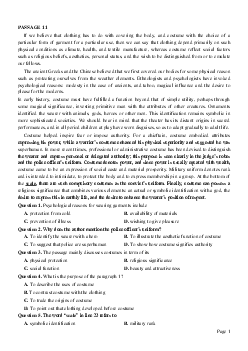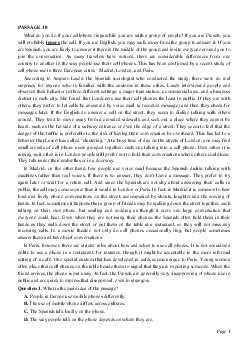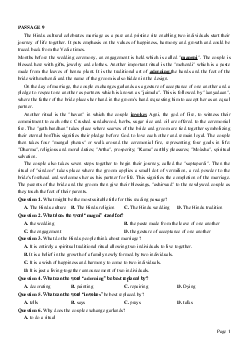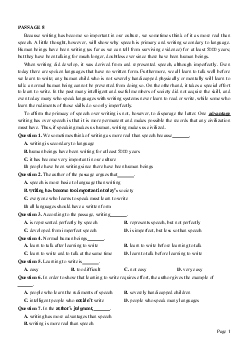


Preview text:
PASSAGE 21
Sadly, the reading habit is on the decline among children as well. Popeye and his gang, aided by
multimedia games have drowned the shuffle of the pages. Though the Harry Potter mania is gripping
children these days, it could just be another ephemeral phase withering away sooner or later.
“But why blame it on the kids for all this wean-off-from-reading culture? It is the parents who are
responsible for this,” says an English professor. Parents blame it on the mounting pressure on the children
in schools and tuition classes. “My son hardly gets time to read story books. In the little time he gets after
finishing the home work, all he wants to do is watch the cartoon channel or play video games,” says
Vijaylakshmi whose nine-year-old son ‘is glued to the idiot box whenever he gets the time’. The other
problem is that there is a tremendous pressure upon students to perform and excel.
The situation is no better among college students. Library for them becomes popular only before the
final examination. It is then that the students, in a panic state, just browse through their course related books.
There are also regular visitors to the libraries among them, though they constitute a small minority
who frequently borrow books. ''But more often than not, students visit the libraries for their research work
rather than reading a book for their own pleasure. In fact, nowadays libraries have become common
hangouts for the college students,'' remarks another professor.
(Source: Adapted from Objective PET)
Question 1. How does the writer think about the Harry Potter story?
A. It’s a good book for children.
B. It’s an exceptional book because children love it.
C. It’s not an exceptional book because children will forget it.
D. It is a good example of bettering the children’s reading habit.
Question 2. According to the writer, who should be blamed for the children’s wean-off-from-reading culture? A. Teachers. B. Parents.
C. Both teachers and parents.
D. He doesn’t state any.
Question 3. What is the best way to understand the phrase “glued to the idiot box”?
A. The son sits very close to TV.
B. The son is addicted to TV.
C. The son is short-sighted
D. The son is long-sighted.
Question 4. The word “them” refers to . A. college students B. libraries
C. course related books D. visitors
Question 5. Most of the college students mentioned in this passage . A. like researching
B. frequently go to the library
C. borrow books in the library for pleasure
D. only come to the library before exams Page 1 ĐÁP ÁN 1-C 2-D 3-B 4-A 5-D
LỜI GIẢI CHI TIẾT Question 1: C
Nhà văn nghĩ thế nào về câu chuyện Harry Potter?
A. Nó là một cuốn sách hay cho trẻ em.
B. Nó là một cuốn sách đặc biệt bởi vì trẻ em thích nó.
C. Nó không phải là một cuốn sách đặc biệt bởi vì trẻ em sẽ quên nó.
D. Đó là một ví dụ điển hình về việc cải thiện thói quen đọc sách của trẻ em.
DẪN CHỨNG: Though the Harry Potter mania is gripping children these days, it could just be another
ephemeral phase withering away sooner or later.
DỊCH: Mặc dù cơn cuồng Harry Potter đang kẹp chặt trẻ em ngày nay, nó chỉ có thể là một giai đoạn phù
du khác héo mòn sớm hay muộn. Question 2: D
Theo nhà văn, ai là người có lỗi vì Văn hóa đọc của trẻ em bị mất đi? A. Giáo viên. B. Cha mẹ.
C. Cả giáo viên và phụ huynh.
D. Ông ấy không nhắc đến
DẪN CHỨNG: “But why blame it on the kids for all this wean-off-from-reading culture? It is the parents
who are responsible for this,” says an English professor. Parents blame it on the mounting pressure on the
children in schools and tuition classes…. Ở đây là ý kiến của 1 giáo sư người Anh chứ không phải của tác
giá, nhà văn vẫn chưa đề cập nguyên nhân do ai.
DỊCH: Nhưng tại sao lại đổ lỗi cho bọn trẻ vì tất cả văn hóa đọc đang bị mất đi này? Chính cha mẹ là
người chịu trách nhiệm cho việc này, một giáo sư người Anh nói. Cha mẹ đổ lỗi cho áp lực gắn kết với trẻ
em trong các trường học và các lớp học phí….. Question 3: B
Cách hiểu đúng nhất cụm từ “glued to the idiot box” là gì?
A. Con trai ngồi rất gần TV. B. Con trai nghiện tivi. C. Con trai bị cận thị
D. Con trai bị viễn thị.
DẪN CHỨNG: “My son hardly gets time to read story books. In the little time he gets after finishing the
homework, all he wants to do is watch the cartoon channel or play video games,” says Vijaylakshmi
whose nine-year-old son ‘is glued to the idiot box whenever he gets the time’.
DỊCH: Con trai tôi hầu như không có thời gian để đọc sách truyện. Trong một thời gian ngắn sau khi
hoàn thành công việc nhà, tất cả những gì anh muốn làm là xem kênh phim hoạt hình hoặc chơi trò chơi
điện tử, đứa con trai 9 tuổi của Vijaylakshmi thì cứ “dán mắt vào tivi” bất cứ khi nào anh ấy có thời gian' . Question 4: A
Từ “them” họ đề cập đến .
A. sinh viên đại học B. thư viện
C. sách liên quan đến khóa học D. khách Page 2
DẪN CHỨNG: It is then that the students, in a panic state, just browse through their course related books.
There are also regular visitors to the libraries among them…..
DỊCH: Sau đó, các sinh viên, trong trạng thái hoảng loạn, chỉ cần duyệt qua các cuốn sách liên quan đến
khóa học của họ.Ngoài ra còn có khách truy cập thường xuyên đến các thư viện trong số các sinh viên. Question 5: D
Hầu hết các sinh viên đại học được đề cập trong đoạn này . A. thích nghiên cứu
B. thường xuyên đến thư viện
C. mượn sách trong thư viện cho vui
D. chỉ đến thư viện trước khi thi.
DẪN CHỨNG: The situation is no better among college students. Library for them becomes popular only before the final examination.
DỊCH: Tình trạng này cũng không khá hơn ở các sinh viên đại học. Thư viện cho họ trở nên phổ biến chỉ
trước kì kiểm tra cuối cùng. Page 3




